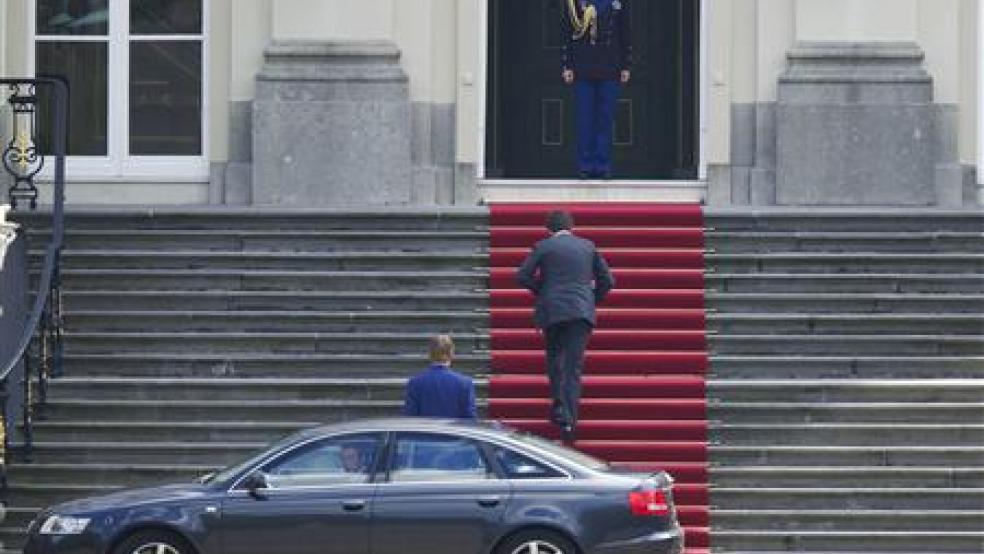AMSTERDAM (Reuters) - The Netherlands has called an election for September 12, leaving the country open to months of political and economic uncertainty after the government collapsed in a row over budget cuts that are needed to meet strict EU limits.
The euro zone's fifth-largest economy has been one of its most stable but plunged into political crisis on Monday, when the government lost the support of its main ally, becoming a victim of growing resistance to EU-imposed austerity.
Financial markets have been unsettled by the inability of one of Europe's few AAA-rated countries to agree on the same deficit-cutting they have demanded of others.
Dutch bonds fell sharply on Monday but have since rallied with investors saying the economy still looks quite strong.
The outgoing government now has less than a week to win opposition support for a savings package it must present to the European Commission. Prime Minister Mark Rutte will send his latest budget plan to parliament later on Wednesday.
"If the parties manage to agree on a sufficient number of measures, bond markets will receive this positively," Walter Leering, fixed income analyst at Dutch private bank Theodoor Gilissen said in a note.
"If not, and the country is in a vacuum until elections, the pressure on interest rates and the AAA rating will probably increase again."
The largest opposition parties have refused to back Rutte's 14 to 16 billion euro package of cuts, with many saying meeting the EU's target of 3 percent of gross domestic product would lead to economic misery.
Europe's politicians are facing a wave of resistance to austerity that some economists say is necessary to solve a debt crisis that has seen Greece, Ireland and Portugal seeking outside financial aid.
The International Monetary Fund has cautioned Europe against cutting spending too far and too fast at the expense of restarting economic growth.
The Dutch political crisis comes as French voters seem poised to chose economic growth over austerity by voting for Socialist presidential candidate Francois Hollande over conservative President Nicolas Sarkozy on May 6.
Asked about the Dutch problems, European Central Bank President Mario Draghi said on Wednesday the euro area "must continue to be a credible area of price stability, fiscal stability and growth."
FISCALLY CONSERVATIVE
The Netherlands is one of the euro zone's most fiscally conservative members and the government has been critical of the region's "budget sinners", the countries struggling to bring down their deficits.
All ten parties in parliament are broadly supportive of budget cuts but not to the extent needed to reach the EU limit.
Rutte, who will stay in place until the elections, is hoping to push his plans through the 150-seat parliament on Thursday with the help of small opposition groups. His Liberal Party has 31 seats and his coalition partner has 21 seats.
The smaller opposition parties which appear to be supportive of getting the budget deficit down to 3 pct of GDP include Democrats 66, with 10 seats, Christian Union, with 5 seats, and the Reformed Party (SGP), with 2 seats.
That gives a total of 69 seats and he needs 76 to pass the budget. The positions of the 10-seat GreenLeft Party and the 2-seat Animal Party are unclear.
The plan Rutte will send to parliament is expected to be similar to the one he negotiated with Geert Wilders' euro skeptic, anti-Islam Freedom Party.
Wilders had supported the government for 18 months before abruptly withdrawing his backing over the weekend after seven weeks of talks. Without the savings, the deficit is forecast to reach 4.6 percent of GDP next year.
Wilders said he had enough of being dictated to by Brussels but Dutch media say the government's collapse may mean that many of his policies, such as a ban on face veils, primarily aimed at Muslim women, may not be turned into law.
SOUND FUNDAMENTALS
Dutch bonds have held up reasonably well despite the political turmoil.
The spread on Dutch 10-year government bonds compared with the German equivalent, Europe's benchmark, leapt to its widest in three years on Monday.
But it has since fallen back, while the Dutch 10-year bond yield fell to around 2.335 percent on Wednesday from around 2.348 percent late on Tuesday.
Investors said they were focused on the strong economy, relative to other members of the euro zone. Unemployment and debt levels are low and the country is running a trade surplus.
"Probably some investors have had a bit of a knee-jerk reaction and seen this political instability and thought 'I want to get out'," said Lyn Graham-Taylor, fixed income strategist at Rabobank.
"But then you have probably got a fair amount of people on the other side of it who thought, 'well actually I still like the fundamentals, I think the Dutch generally, across the parties, are fiscally conservative and they will sort something out.'"
The political crisis has attracted the attention of ratings agency Moody's. It reaffirmed the country's top notch credit score on Monday but said it could come under pressure if its commitment to fiscal discipline weakened.
(Additional reporting by Gilbert Kreijger and Ana da Costa; Editing by Anna Willard)


